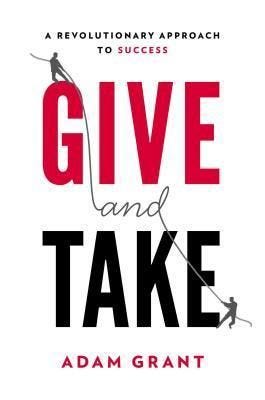In the context of reciprocity styles, people’s way of exchanging value in social interactions, do you think givers, takers, or matchers become most successful as individuals? And why?
So much of the business success in a startup is predicated on who you know, who you can get to work with you, and who knows you. More importantly, how you interact with them and what is their impression of you. What is your brand in their minds!
At our “founders’ health” session, we talked about Adam Grant’s book, Give & Take.
The book presents 3 categories of styles: Givers (willing to help, knowledge sharer, and empathetic), takers (self-centered, poor listener, manipulative), and matchers (transactional and calculative, and seeking fairness and balance).
The book goes on to give anecdotes of how people in these different categories fared in the world of business and sports. How takers might take more credit and be the loudest but people lose trust in them. How matchers’ tit for tat approach limits their pool of options. And how givers might be so obsessed with pleasing others that forget about taking care of themselves.
It then introduces a sub-category of givers it calls “otherish givers”. These are people who help others but do so in a way that maximizes the impact without maximizing self-sacrifice. One example might be the busy person who gives free career advice but only on Friday afternoons. Or someone who creates an environment where giving is the default behavior (eg. second hand goods exchange page on social media).
The book argues, largely based on anecdotal evidence, that selfless givers are the “losers” followed by matchers and givers at the second place, and otherish givers on the top of the performance charts. It proposes that “otherish givers” perform much better because they most frequently get the benefit of the doubt, they build strong networks and network effects, and they strategically avoid the negative aspects of giving.
One thing that some of us didn’t like is the general categorization of people into buckets. We all saw being associated with any of these styles much more contextual and state-like than personality traits. I can be a giver in a situation where I feel my contribution makes a difference, and at the same time extremely stingy with my time if I feel the person receiving my help is manipulative.
This also means that putting a person cleanly in a bucket could be pretty complex. Like, is Jeff B. a taker because he has grown his company "at all costs" and has put small shops out of business? or is he a giver because he has created so many jobs and empowered so many businesses in the amazon marketplace? Hard to say… While there are general patterns that can be learned, completely ruling out a person based on an over-generalized label and ignoring the fluidity of human nature could be a slippery slope as well.
Another thing that is tricky to infer is the intention of the person who is doing something nice for us: "this thing X did for me was nice but I don't know if it was kind because I dont know their intention". I think when it comes to social interactions, the best bet we have is to guess someone's intentions based on their pattern of behavior rather than isolated actions. This makes “theory of mind” quite a relevant topic to explore in this context as well.
As someone who doesn’t believe in altruism, I was also hoping that the book would expand on the underlying insecurities and incentives driving these social behaviors as well. Like, could it be that selfless giving comes from an attachment style that results in people pleasing type of behaviors? Or could it be that matching is a consequence of risk aversion and seeking security in predictability? Or maybe you tend to “take” if you grew up in settings where you needed to compete for every single bit of resources. And I could believe that the pragmatic approach of otherish giving comes from a desire to have a secure attachment style.
A lot of the “traits” the book associates with each of the buckets also looked very similar to what you’d generally associate with emotional intelligence. So we wondered if EQ could be another way to think about these styles and their consequences. And if the overall takeaway could simply be: work on your EQ!
The big takeaway for me from our discussion though is that you can think about “otherish givers” as people who create platforms or systems to amplify their positive impact, and are obsessed with creating and playing non-zero sum games.
And that’s what I want to be when I grow up…
Maximize the value I provide in every single social interaction.





